- Home
- Franz Kafka
The Lost Writings
The Lost Writings Read online
The Lost Writings
Also available from New Directions
Franz Kafka
(translated by Michael Hofmann)
Amerika: The Man Who Disappeared
Investigations of a Dog: Stories
Reiner Stach
Is That Kafka? 99 Finds
Selection and afterword copyright © 2020 by Reiner Stach
Translation copyright © 2020 by Michael Hofmann
All rights reserved. Except for brief passages quoted in a newspaper, magazine, radio, television, or website review, no part of this book may be reproduced in any form or by any means, electronic or mechanical, including photocopying and recording, or by any information storage and retrieval system, without permission in writing from the Publisher.
publisher’s note: All texts are translated from volume II of Nachgelassene Schriften und Fragmente (S. Fischer Verlag), except for pp. 3 and 109–128, which are drawn from volume I.
First published clothbound in 2020
Manufactured in the United States of America
Library of Congress Cataloging-in-Publication Data
Names: Kafka, Franz, 1883–1924, author. | Stach, Reiner, compiler, writer of afterword. | Hofmann, Michael, 1957 August 25– translator.
Title: The lost writings / Franz Kafka ; selected & with an afterword by Reiner Stach ; translated by Michael Hofmann.
Description: First edition. |
New York : A New Directions Paperbook, 2020.
Identifiers: LCCN 2020021801 | ISBN 9780811228015 (cloth ; acid-free paper) |
ISBN 9780811228022 (ebook)
Classification: LCC PT2621.A26 A6 2020 | DDC 833/.912–dc23
LC record available at https://lccn.loc.gov/2020021801
New Directions Books are published for James Laughlin
by New Directions Publishing Corporation
80 Eighth Avenue, New York 10011
The Lost Writings
I lay on the ground at the foot of a wall, writhing in agony, trying to burrow down into the damp earth. The hunter stood next to me, pressing his foot gently down on my back. A capital specimen, he said to the driver, already cutting through my jacket and collar to feel me. The dogs, bored with me already and avid for new tasks, were running mindlessly against the wall. The coach arrived, and with hands and legs bound I was tossed next to the gentleman on the back seat, with my head and arms dangling out of the window. The drive was brisk; athirst, with open mouth, I breathed in clouds of dust, and every so often I felt the gentleman greedily pinching my calves.
So, you want to leave me? Well, one decision is as good as another. Where will you go? Where is away-from-me? The moon? Not even that is far enough, and you’ll never get there. So why the fuss? Wouldn’t you rather sit down in a corner somewhere, quietly? Wouldn’t that be an improvement? A warm, dark corner? Aren’t you listening? You’re feeling for the door. Well, where is it? So far as I remember, this room doesn’t have one. At the time this was built, no one had imagined such earth-shattering plans as yours. Well, no matter, a thought like yours won’t get lost, we’ll discuss it over dinner, and our laughter will be your reward.
A large loaf of bread lay on the table. Father came in with a knife to cut it in half. But even though the knife was big and sharp, and the bread neither too soft nor too hard, the knife could not cut into it. We children looked up at Father in surprise. He said: “Why should you be surprised? Isn’t it more surprising if something succeeds than if it fails? Go to bed, perhaps I’ll manage it later.” We went to bed, but every now and again, at all hours of the night, one or another of us got up and craned his neck to look at Father, who stood there, the big man in his long coat, his right leg braced behind him, seeking to drive the knife into the bread. When we woke up early in the morning, Father was just laying the knife aside and said: “You see, I haven’t managed yet, that’s how hard it is.” We wanted to distinguish ourselves, and he gave us permission to try, but we could hardly lift the knife, whose handle was still almost glowing from Father’s efforts, it seemed to rear up out of our grasp. Father laughed and said: “Let it go, I’m going out now, I’ll try again tonight. I won’t let a loaf of bread make a monkey out of me. It’s bound to let itself be cut in the end; of course it’s allowed to resist, so it’s resisting.” But even as he said that, the bread seemed to shrivel up, like the mouth of a grimly determined person, and now it was a very small loaf indeed.
I can swim as well as the others, only I have a better memory than they do, so I have been unable to forget my formerly not being able to swim. Since I have been unable to forget it, being able to swim doesn’t help me, and I can’t swim after all.
Boats glided past. I hailed one. The pilot was a solidly built old man with a white beard. I hesitated a little on the pier. He smiled, and looking at him, I climbed in. He pointed to the far end of the boat, and I sat down there. Only to leap up right away, exclaiming: “Large bats you have here,” because some large wings had flapped around my head. “Be quiet,” he said, already busy with the boat hook, and we pushed off so hard that I almost fell back onto my seat. Instead of telling the pilot where I wanted to go, I asked him if he knew; from his nodding, he knew. That was a great relief to me, I stretched out my legs and leaned back my head, though always keeping an eye on the pilot, and told myself: “He knows where you want to go; behind that brow of his he knows. And he’s dipping his oars into the sea to get you there. And by chance it was him you called out to out of all of them, and you even hesitated before getting on board.” With satisfaction I closed my eyes a little, but if I wasn’t to see the man I at least wanted to hear him, so I asked: “At your age, you probably shouldn’t be working any more. Haven’t you any children?” “Only you,” he replied, “you are my only child. It’s only for you that I’m undertaking this trip, then I will sell the boat and stop working.” “You refer to your passengers as children here?” I asked. “Yes,” he said, “that’s the custom here. And the passengers call us Father in turn.” “Curious,” I said, “so where’s mother?” “There,” he said, “in the cabin.” I got up and in the little round window of the cabin that was stuck in the middle of the boat I saw a hand stretched out in greeting, and the sharply etched features of a woman framed in a black lace kerchief appeared. “Mother?” I asked with a smile. “If you like — ” she said. “But you’re so much younger than Father?” I said. “Yes,” she said, “much younger, he could be my grandfather, and you my husband.” “You know,” I said, “it’s a strange thing if you’re in a boat at night all alone, and suddenly a woman crops up [. . .]
It’s the animal with the long tail, the fox-like tail many yards long. I would love to be able to lay my hand on such a tail, but it’s not possible, the animal is in constant movement, and its tail flicks out this way and that. The animal resembles a kangaroo, but unusually in its small, flat, oval, almost human-looking face, only its teeth are expressive, whether it bares or conceals them. Sometimes I have the feeling the animal wants to train me; what other reason could it have for withdrawing its tail from me as I reach out to grab it, and then waiting patiently till I am drawn to it again, only to leap away once more.
The deep well. It takes years for the bucket to reach the top, then in an instant it plummets to the bottom, faster than you can lean down; you think you are still holding it in your hands and already you hear the faraway splash, but you’re not even listening.
A farmer stopped me on the highway and begged me to come back to his house with him, perhaps I could help, he’d had a falling out with his wife, and their argument was wrecking his life. He also had some simple-minded children who hadn’t turned out well, they just stood
around or got up to mischief. I said I would be happy to go with him, but it was doubtful whether I, a stranger, would be able to help him in any way, I might be able to put the children to some useful task, but I’d probably be helpless with respect to his wife, because quarrelsomeness in a wife usually has its origin in some quality in the husband and since he was unhappy with the situation, he had probably already taken pains to change himself but hadn’t succeeded, so how could I possibly have more success? At the most, what I could do was divert the ire of the wife to myself. At the beginning, I was speaking more to myself than to him, but then I asked him what he would pay me for my trouble. He said we would rapidly come to some agreement; if I turned out to be of use, I could help myself to whatever I wanted. At that I stopped and said this sort of vague promise was not going to satisfy me, I wanted a precise agreement as to what he would give me per month. He was astonished that I demanded anything like a monthly wage from him. I in turn was astonished that he was astonished. Did he suppose I could fix in a couple of hours what two people had done wrong over the course of their entire lives, and did he expect me at the end of those two hours to take a sack of dried peas, kiss his hand in gratitude, bundle myself up in my rags, and carry on down the icy road? Absolutely not. The farmer listened in silence, with head lowered but tense. The way I saw it, I told him, I would have to stay with him a long time to first become familiar with the situation and think about possible improvements, and then I will have to stay even longer to create proper order, if such a thing was even possible, and by then I will be old and tired and will not be going anywhere but will rest and enjoy the thanks of the parties involved.
“That won’t be possible,” said the farmer. “Here you are wanting to install yourself in my house and maybe even drive me out of it in the end. Then I would be in even more trouble than I am already.” “Unless we trust one another we won’t come to an agreement,” I said. “Have I not shown I have trust in you? All I have is your word and couldn’t you break that? After I’d arranged everything in accordance with your wishes, couldn’t you send me packing, for all your promises?” The farmer looked at me and said: “You would never let that happen.” “Do what you want,” I said, “and think of me as you please but don’t forget — I’m saying this to you in friendship, as one man to another — that if you don’t take me with you, you won’t be able to stand it for much longer in your house. How are you going to go on living with your wife and those children? And if you don’t take a chance and take me home with you, then why not drop everything and all the trouble you’ll go on having there, and come with me, we’ll go on the road together, and I won’t hold your suspicions against you.” “I’m not at liberty to do that,” said the farmer, “I’ve been living with my wife now for fifteen years, it was difficult, I don’t even understand how I did it, but in spite of that I can’t just abandon her without having tried everything that might her bearable. Then I saw you on the road, and I thought I might make one final effort with you. Come with me, I’ll give you whatever you want. What do you want?” “I don’t want much,” I said, “I’m not out to exploit your predicament. I want you to take me on as your laborer for life, I can do all sorts of work and will be very useful to you. But I don’t want to be treated like other laborers, you’re not to give me orders, I have to be allowed to do what work I please, now this, now that, now nothing at all, just as I please. You can ask me to do something so long as you’re very gentle about it, and if you see that I don’t want to do it, then you’ll have to accept the fact. I won’t require money, but clothes, linens, and boots up to present standards, and replaced when necessary; if such things are unobtainable in your village, then you’ll have to go into town to buy them. But don’t worry about that, my present clothes should last me for years. I’ll be happy with standard laborers’ fare, only I do insist on having meat every day.” “Every day?” interjected the farmer, as though satisfied with all the other conditions. “Every day,” I said. “I note your teeth are unusual,” he said, trying to excuse my unusual stipulation, and he even reached into my mouth to feel them: “Very sharp,” he said, “like a dog’s.” “Well, anyway, meat every day,” I said. “And as much in the way of beer and spirits as you.” “That’s a lot,” he said, “I drink a lot.” “So much the better,” I said, “then if you tighten your belt, I’ll tighten mine. Probably you only drink like that because of your unhappy home life.” “No,” he said, “why should that be connected? But you shall have as much as me, we’ll drink together.” “No,” I said, “I refuse to eat or drink in company. I insist on eating and drinking alone.” “Alone?” asked the farmer in astonishment, “all these wishes are making my head spin.” “There’s not so much,” I said, “and I’ve almost got to the end. I want oil for a lamp that is to be kept burning at my bedside all night. I have the lamp here, just a very little one, it runs on next to nothing. It’s really hardly worth mentioning, and I just mentioned it for the sake of completeness, lest there be some subsequent dispute between us; I dislike such things when it comes to being paid. At all other times I am the mildest of men, but if terms once agreed are violated, I cut up rough, remember that. If I am not given everything I have earned, down to the last detail, I am capable of setting fire to your house while you’re asleep. But you have no need to deny what we have clearly agreed, and then, especially if you make me the occasional present out of affection, it doesn’t have to be worth much, just the odd little trifle, I will be loyal and hardy and very useful to you in all manner of ways. And I shall want nothing beyond what I have told you just now, only on August 24, my name day, a little two-gallon barrel of rum.” “Two gallons!” exclaimed the farmer, clapping his hands together. “Yes, two gallons,” I said, “it’s not so much. You probably think you can beat me down. But I’ve already reduced my requirements to the bones, out of regard for you of course, I would be ashamed if some stranger were to hear us. I couldn’t possibly speak as we have just now in front of a stranger. So no one is to hear of our agreement. Well, who would believe it in any case.” But the farmer said, “It’s better that you go your own way. I will go on home and try to make things up with the wife. It’s true, I have beaten her a lot of late, I think I’ll let up a little, perhaps she’ll be grateful to me, and I’ve beaten the children a lot as well, I always get the whip out of the stables and beat them, I’ll ease up on that a bit, maybe things will improve. Admittedly, I’ve tried it in the past without the least improvement. But your demands are too much, and even if they weren’t, but no, it’s more than the business will bear, not possibly, meat every day, two gallons of rum, even if it had been possible, my wife would never allow it, and if she doesn’t allow it, then I can’t do it.” “So why the long negotiations,” I said [. . .]
I loved a girl who loved me back, but I was forced to leave her.
Why?
I don’t know. It was as though she was surrounded by a ring of armed men who held out their lances in all directions. No matter how I sought to approach, I encountered their sharp points, was wounded, and had to retire. I suffered badly.
Was the girl in no way responsible?
I don’t think so, in fact, I know she wasn’t. The above comparison was not the whole story, because I too was ringed by armed men, though they pointed their lances backward, in my direction. As I moved toward the girl, I was immediately caught in the lances of my own men and could make no further progress. It’s possible that I never came close to the armed men of the girl, and if I did, then I was already bleeding and insensible from the lances of my own men.
Did the girl remain alone then?
No, another suitor got through to her, easily and unhindered. Exhausted by my own efforts, I watched as indifferently as though I were the air through which their faces met in their first kiss.
I was staying in the Hotel Edthofer, Albian or Cyprian Edthofer, some name like that, I can’t quite remember the whole of it, probably I wouldn’t be able to find it again either, ev
en though it was a very large hotel and extremely well appointed and managed. Nor can I remember why, even though I was barely there for a week, I was put to the trouble of changing rooms almost every day, so I often wouldn’t know my room number and when I got back during the day or in the evening, I would have to ask the chambermaid which one it was. At least all the rooms that were possible for me were on one floor, and even one corridor. There weren’t many of them either, so I didn’t have to go looking for long. Was it perhaps just this one corridor that served hotel purposes, while the rest of the building was apartments, something like that? I don’t remember, perhaps I didn’t even know at the time, it didn’t bother me. But it does seem unlikely, since the building had large metal lettering on the front, widely spaced and not very luminous, a sort of reddish-matte metal with the word Hotel and the name of the owner. Or was it perhaps just the name of the owner, without the Hotel? It’s possible, and that might explain something. Even today from my unclear memory, I would think the word Hotel was there. Many officers stayed there. Of course, I spent most of my days in the city, I had lots to do and a lot to see so I didn’t have time to observe the hotel scene, but I know I saw a lot of officers there. Agreed, there was a barracks next door, or not really next door, the connection between the hotel and the barracks was somehow different, both looser and tighter. At this distance in time it’s not easy to describe, in fact, even then it wouldn’t have been easy, I didn’t seriously set myself to define the relationship, even though this opacity did sometimes make difficulties for me. Sometimes when I came home at night, with my head bonging with the din of the big city, I was unable to find the hotel entrance right away. It’s true, the entrance does seem to have been very small, it’s even possible — though this would have been odd — that there was no proper entrance as such, but to go into the hotel you first had to make your way through a restaurant. It may have been that way, but then even the door of the restaurant wasn’t always easy to find. Sometimes I thought I was standing in front of the hotel, but I was actually standing in front of the barracks, in a completely different square, quieter and cleaner than the one in front of the hotel, yes, deathly quiet and awesomely clean, but somehow it was able to be taken for the other. Then you had to go around the corner to find yourself in front of the hotel. It seems to me now that sometimes, only sometimes admittedly, you could get from the quiet square — say, with the help of an officer who was going the same way — and find the hotel entrance right away, and not a second or back entrance either, but the one through the restaurant, a narrow and unusually lofty door, covered on the inside by a fine white muslin curtain hemmed with satin ribbon. And all the time, the hotel and the barracks were two perfectly distinct buildings, the hotel lofty in the familiar hotel style, though admittedly with a touch of revenue house about it, while the barracks was low and squat like a sort of Roman castello. The barracks explained the constant presence of so many officers; I never saw any sign of men. I can’t remember how I learned that the seeming castello was actually a barracks, but I had occasion to occupy myself with it on frequent occasions, as mentioned above, when angrily looking for the hotel door I wandered around the quiet square. Once I was up in the corridor, however, I was home free. And I did feel very much at home there, happy in the big strange city to have found such a welcoming abode.

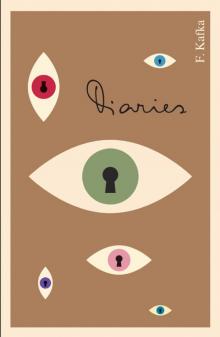 Diaries of Franz Kafka
Diaries of Franz Kafka Metamorphosis and Other Stories
Metamorphosis and Other Stories The Castle: A New Translation Based on the Restored Text
The Castle: A New Translation Based on the Restored Text The Complete Stories
The Complete Stories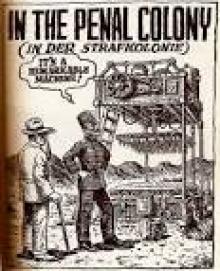 In the Penal Colony
In the Penal Colony The Trial
The Trial Amerika
Amerika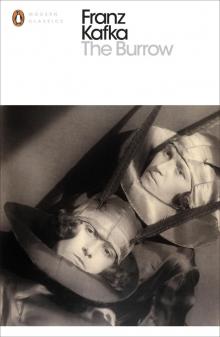 The Burrow: Posthumously Published Short Fiction
The Burrow: Posthumously Published Short Fiction Sons
Sons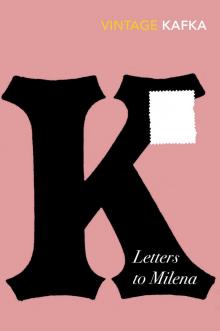 Letters to Milena
Letters to Milena Investigations of a Dog: And Other Creatures
Investigations of a Dog: And Other Creatures Collected Stories
Collected Stories The Great Wall of China
The Great Wall of China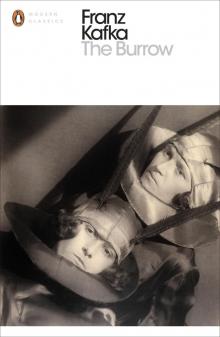 The Burrow
The Burrow The Castle
The Castle The Meowmorphosis
The Meowmorphosis The Sons
The Sons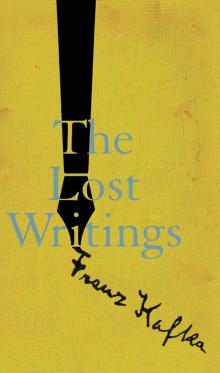 The Lost Writings
The Lost Writings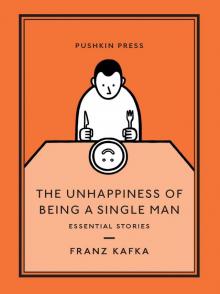 The Unhappiness of Being a Single Man
The Unhappiness of Being a Single Man Amerika: The Missing Person: A New Translation, Based on the Restored Text
Amerika: The Missing Person: A New Translation, Based on the Restored Text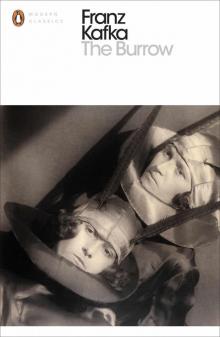 The Burrow: Posthumously Published Short Fiction (Penguin Modern Classics)
The Burrow: Posthumously Published Short Fiction (Penguin Modern Classics)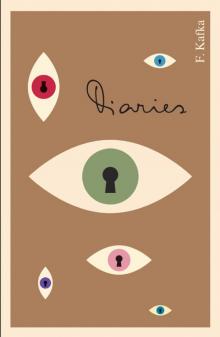 The Diaries of Franz Kafka
The Diaries of Franz Kafka Investigations of a Dog
Investigations of a Dog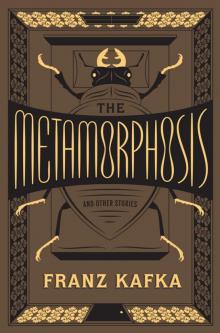 The Metamorphosis and Other Stories
The Metamorphosis and Other Stories The Trial: A New Translation Based on the Restored Text
The Trial: A New Translation Based on the Restored Text